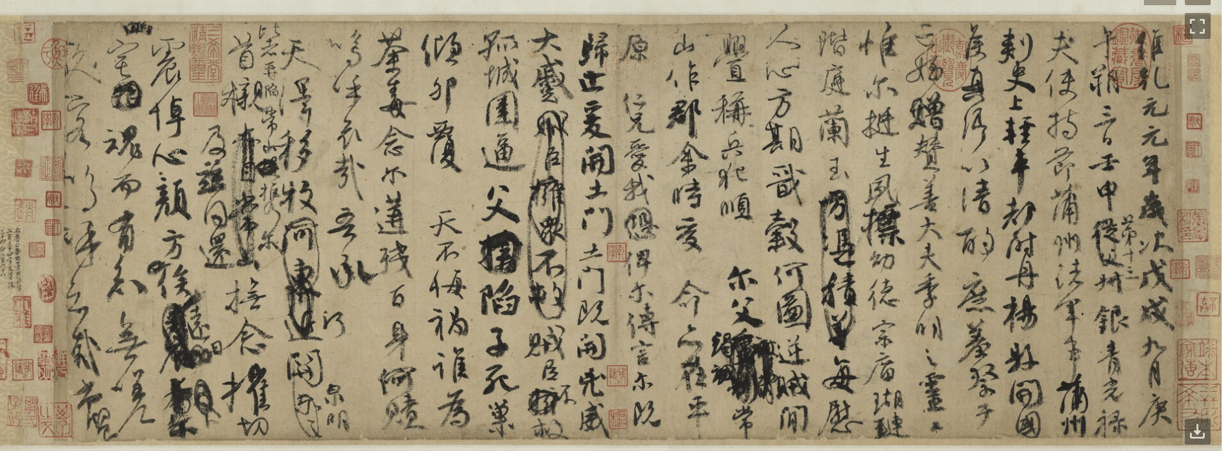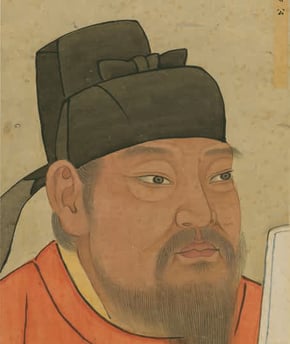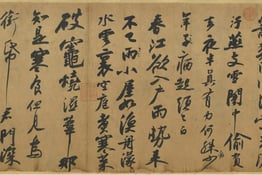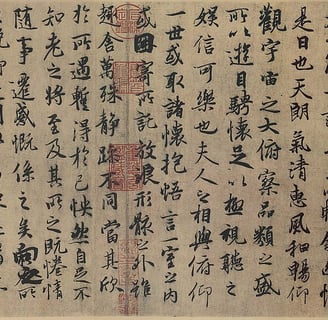

About “Ji Zhi Wen Gao” or “Eulogy for My Nephew” (《祭侄文稿》)
During the Tang Dynasty, when the general An Lushan (安禄山) rebelled against the central government. He captured the eastern capital Luoyang, and later took Chang’an, the main capital of the Tang Empire. The rebellion plunged China into chaos, caused massive destruction, and resulted in the deaths of millions. It finally ended in 763 after years of intense warfare.
Yan Zhenqing (颜真卿, 709–785), a prominent Tang official, general, and calligrapher, played a significant role in the early stages of the rebellion. As governor of Pingyuan County, Yan remained steadfastly loyal to the Tang court. When An Lushan’s forces advanced, he organized a local militia and successfully defended Pingyuan, even though he was greatly outnumbered. He collaborated with his cousin Yan Gaoqing, governor of Changshan County, to mount a coordinated resistance against the rebel army.
In addition to his political and military accomplishments, Yan Zhenqing is revered as one of the greatest calligraphers in Chinese history. His famous work, “Ji Zhi Wen Gao” or “Eulogy for My Nephew” (《祭侄文稿》), often referred to as the “second-best running script,” is a powerful and emotionally charged piece. It holds a special place in both literary and artistic history for its expressive force and sincerity.
After the rebellion began, both Yan Zhenqing and Yan Gaoqing defended their respective counties with great bravery. Yan Gaoqing was eventually captured and died for the Tang cause. His son, Yan Jiming, was also killed by the rebels for refusing to surrender. In 758, Yan Zhenqing recovered his nephew’s remains and, overwhelmed with grief, wrote the eulogy to honor his sacrifice.
What makes this work so extraordinary is not just its emotional depth but also its raw, unpolished form. The piece is a draft, filled with corrections, ink smudges, and hurried strokes—none of which were edited or refined. Its authenticity and intensity move viewers to this day. Phrases like “my heart is broken, my face trembles” vividly convey sorrow, anger, and moral conviction. “Eulogy for My Nephew” is one of the rare calligraphic works in Chinese history that so powerfully fuses emotion with art. It transcends technique, offering a direct expression of grief and loyalty.
The brushwork is bold and layered, breaking conventional norms and conveying deep emotional turbulence. Its simplicity in both content and form gives it exceptional artistic and historical value. The text reads like a heartfelt dialogue with the deceased, expressing sorrow, admiration, and condemnation of the rebellion’s chaos. It reflects core Confucian values such as filial piety, loyalty, and righteousness.
Yan Zhenqing pioneered a distinctive regular script style, known for its strong strokes and dignified structure. In contrast, “Eulogy for My Nephew” shows a spontaneous style where “the brush follows the emotion, and the words follow the heart.” He is not only honored as a master calligrapher but also as a symbol of national integrity and moral courage. This treasured manuscript is now housed in the National Palace Museum in Taipei, hailed as “the most moving cursive script” and studied by generations for its calligraphic excellence and profound cultural emotion.
Unlike flat visual arts, calligraphy uniquely captures the temporal flow of writing—each stroke tied to a moment. The visible changes in ink, corrections, and layering in this piece invite close attention. The brushwork reflects the surging emotions in Yan Zhenqing’s heart, allowing viewers to experience the rhythm of thought and grief through the living movement of ink on paper.


Eulogy for My Nephew
Yan, Zhenqunging
It was the first year of Emperor Suzong of Tang (758 AD), and the lunar calendar was the year of Wuxu. The first day of the ninth month of the lunar calendar was Gengwu, and the third day was Renshen. (Yan Jiming's) thirteenth uncle, the Guanglu doctor wearing a silver seal and a green ribbon. He was given the title of Envoy and the governor of Puzhou. He was awarded the honor of Shangqingli Duwei and promoted to the title of Danyang County Kaiguo Hou. Now, sake and a variety of delicacies are used to worship the soul of the nephew of the praise doctor Yan Jiming. The lyrics say:
Only you (Jiming) were born outstanding, and you have always shown virtues that are rare in young people. You are like a treasure in my ancestral temple, and like the fragrant grass and fairy trees growing in our courtyard, which often make us feel very happy. Just when we hoped that (Jiming) could be happy and be a good official, who would have thought that the traitor (An Lushan) would take the opportunity to provoke and rebel. Your father (Yan Gaoqing) worked hard and served as the governor of Changshan. I (Yan Zhenqing) was appointed by the court and served as the governor of Pingyuan. My dear brother (Gaoqing) asked you to pass on the message to me (i.e. to serve as a liaison) out of love for me. Since you have returned to Changshan, the Tumen Gate was recaptured. After the Tumen Gate was opened, the prestige of the evil (An Lushan) was greatly frustrated. The traitor (Wang Chengye) led his troops but did not rescue, resulting in the siege of the isolated city (Changshan). My father (Yan Gaoqing) and son (Yan Jiming and family members) were killed one after another. It's like a bird's nest being knocked down from a tree. The bird eggs will naturally be broken, and there will be no intact eggs! Oh my God! Facing such a tragic disaster, don't you feel regret! Who caused this disaster? Thinking of you (Jiming) suffering such a cruelty (only the head was left after being killed, and the body was lost). How can a hundred bodies redeem your true body? Alas!
I received the grace from the Lord and was sent to Heguan (Puzhou) as a shepherd. When my relatives are well, I will go to Changshan again and bring back the coffin containing your head. The feelings of condolence and longing are overwhelming, and the great sorrow makes my heart tremble and my face pale. Please wait for a distant day and choose a good cemetery. If your soul knows, please do not complain about being a guest here for a long time.
Alas! Please enjoy these offerings!
Yan, Zhenqing was a famous Tang Dynasty politician, military commander, and calligrapher. He is widely praised for his unwavering loyalty to the Tang court during times of crisis, especially during the An-Shi Rebellion, and for his profound influence on Chinese calligraphy.
Yan Zhenqing was born in Linyi, Shandong Province, into a family of scholars whose ancestors could be traced back to Confucius' disciple Yan Hui ( 颜回). Yan Zhenqing received a classical education from an early age and passed the imperial examination in 734, which marked the beginning of his distinguished official career. In his early years, he served in various administrative and judicial positions and was known for his fairness, integrity, and ability to govern the country. His keen sense of justice and deep Confucian values permeated his political and personal life.
Yan Zhenqing's most notable political contribution came during the An-Shi Rebellion (755-763), when the Tang Dynasty was threatened by a rebellion led by General An Lushan. At the time, Yan Zhenqing was the prefect of Pingyuan County. Rather than capitulate, he organized local resistance and worked with his cousin Yan Gaoqing to fight the rebels. Despite Yan Zhenqing's limited military abilities, his resistance symbolized the resistance of loyal ministers and helped the Tang dynasty consolidate its rule over parts of northern China.
After the rebellion, Yan Zhenqing continued to hold important court posts, including governor, censor, and chancellor. His outspoken opposition to corruption and factionalism at court earned him both praise and hostility. In his later years, he became embroiled in political turmoil related to the succession to the throne. In 783, the Tang court faced another rebellion and was forced to flee Chang'an, where Yan Zhenqing was sent as an envoy to negotiate with the rebel general Li Xilie. Yan Zhenqing refused to betray the Tang dynasty and was executed in 785 after firmly resisting pressure to serve the rebels.
In addition to his political and military career, Yan Zhenqing is best remembered as one of the greatest calligraphers in Chinese history. His calligraphy style—strong, structured, and imposing—reflects his moral character and spiritual strength. His most famous works include the "Eulogy for My Nephew", an emotional and expressive work written in memory of his nephew who died during the An-Shi Rebellion. His unique style became a model for later generations, influencing his contemporaries and later calligraphers.
Yan Zhenqing's life embodied the ideals of the Confucian scholar-official - loyal, principled, and virtuous. He was both a loyal minister of the Tang Dynasty and a master of Chinese calligraphy, whose spirit is still highly respected in Chinese culture, and his works are still studied and admired today.
Yan, Zhenqing 颜真卿(709-785)
祭侄文稿 顔真卿
維乾元元年、歲次戊戌、九月庚午朔、三日壬申。第十三(“從父”塗去)叔銀青光祿(脫“大”字)夫使持節蒲州諸軍事、蒲州刺史、上輕車都尉、丹楊縣開國侯真卿。以清酌庶羞祭于亡侄贈贊善大夫季明之靈口:
惟爾挺生,夙標幼德。宗廟瑚琏,階庭蘭玉(“方憑積善”塗去),每慰人心。方期戬谷,何圖逆賊間釁,稱兵犯順。爾父竭誠(“制”塗去,改“被迫”再塗去),常山作郡。余時受命,亦在平原。仁兄愛我(“恐”塗去),俾爾傳言。爾既歸止,爰開土門。土門既開,凶威大蹙(“賊臣擁衆不救”塗去)。賊臣不(“擁”塗去)救,孤城圍逼。父(“擒”塗去)陷子死,巢傾卵覆。天不悔禍,誰爲荼毒?念爾遘殘,百身何贖?嗚乎哀哉!
吾承天澤,移牧(“河東近”塗去)河關。泉明(“爾之”塗去)比者,再陷常山(“提”塗去)。攜爾首榇,及茲同還⑧(“亦自常山”塗去)。撫念摧切,震悼心顔。方俟遠日(“ ”“ ”塗去),蔔(“ ”塗去)爾幽宅(“舍”塗去)。魂而有知,無嗟久客。
嗚呼哀哉尚飨!



